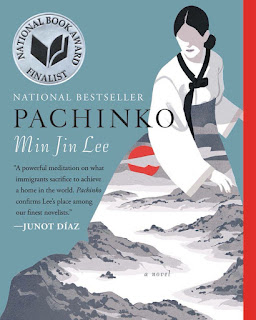Pachinko by Min Jin Lee **** (of 5)
Pachinko is a Japanese gambling game that is part slot machine and part pinball. Fleets of small steel balls tumble past obstructions before dropping into collection buckets worth money or disappearing into worthless drains. Much of the game of Pachinko depends upon the interaction of the player with the loud, musical, highly chaotic descent of a group of balls launched (the player chooses the speed, but not much else) onto the playing surface. Pachinko is a lot like life.
Min Jin Lee delicately and with great sensitivity envelops the lives of four generations of a Korean family. Their saga begins under the Japanese occupation of Korea in the early 1900s. The second and third generations live most of their lives in Japan as second class citizens, roundly despised by most Japanese nationals. In Japan, the Korean family of the story copes with Japanese discrimination, depending upon the character, with Christian forbearance, round-the-clock labor during the years of World War II, attempting to deny their Korean heritage, or absorbing their fate and working in Pachinko galleries. Japanese play Pachinko like an addiction but consider any Korean working in Pachinko to be a gangster, Yakuza, or some worse kind of criminal.
 |
| A Pachinko machine. An operator adjusts the pins that determine where the balls land. |
Min Jin Lee delicately and with great sensitivity envelops the lives of four generations of a Korean family. Their saga begins under the Japanese occupation of Korea in the early 1900s. The second and third generations live most of their lives in Japan as second class citizens, roundly despised by most Japanese nationals. In Japan, the Korean family of the story copes with Japanese discrimination, depending upon the character, with Christian forbearance, round-the-clock labor during the years of World War II, attempting to deny their Korean heritage, or absorbing their fate and working in Pachinko galleries. Japanese play Pachinko like an addiction but consider any Korean working in Pachinko to be a gangster, Yakuza, or some worse kind of criminal.
Throughout, the matriarch of the family, her daughter, and the daughter's sister-in-law, wonder if the lot of women is to suffer. The author introduces us to a century of Korean victimhood so maybe it is all Koreans, not just women, who suffer. Men don't seem to last very long so maybe it is men who suffer. The Japanese come off as so insular and xenophobic that even when the story ends in 1989 you wonder about the long-term health of Japanese culture.
If I have a quibble it is that the fourth generation appears aimless as the story near its end and as a consequence so does the book. The question of why Min Jin Lee has chosen this period in history to cover -- and not a longer or shorter one -- is never quite clear. What does remain, however, is the sense that life really is a hailstorm of little steel balls over which we have little control. Some balls fall into reliable savings and others drain into sewers. What we can control is how we react and the will to persevere as a new round of play begins.


What does pachinko mean for this book?
ReplyDelete